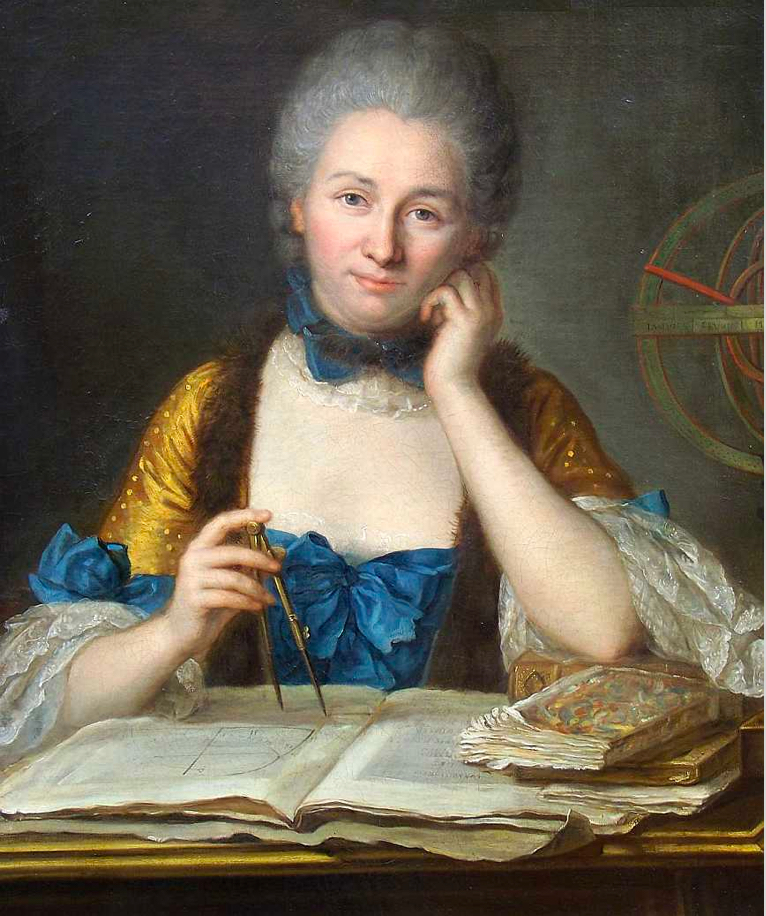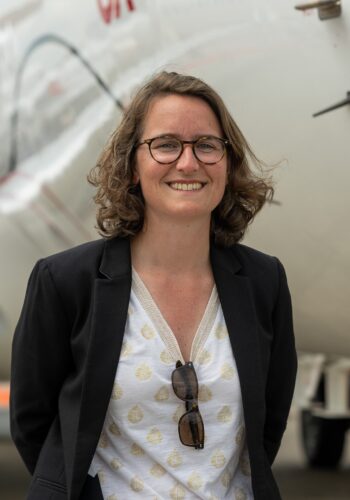Pourquoi la tech ?
Je pense m’être dirigée vers la Tech grâce à des professeurs passionnants en Math et Physique au Lycée. Avec du recul, j’ai peut-être également reproduit un schéma familial (sans pression), mes deux grands frères s’étaient dirigés dans des filières techniques quelques années avant moi.
Votre parcours ?
Après un Bac S, j’ai fait un IUT (Institut Universitaire de Technologie) en Mesures Physiques. Je suis ensuite partie un an en tant que fille au pair à Londres avant d’intégrer une école d’ingénieur (Polytech’ Nantes) en Sciences des Matériaux. Pendant ce cycle ingénieur, j’ai fait deux stages en R&D (Recherche et Développement). Résultat des courses : j’ai obtenu mon diplôme et j’ai découvert que je n’étais pas motivée par la R&D !
Votre première expérience professionnelle dans la tech ?
C’est lors de ma recherche d’emploi que j’ai décidé d’orienter mes recherches vers l’aéronautique (j’avais pris le gout du milieu aéro avec un emploi d’assistante dans une compagnie d’hélicoptères pendant mes études).
J’ai trouvé mon premier emploi dans une PME, cabinet de conseils en Maintenance Aéronautique, dont les clients étaient des compagnies aériennes africaines. J’y ai découvert ce que sont les avions et tout le travail de l’ombre pour les autoriser à voler (les dépannages, la maintenance, les audits avec les autorités …). On appelle ça le suivi de navigabilité.
Que faites-vous aujourd’hui et pourquoi ?
Aujourd’hui je suis ingénieur de piste en charge d’un avion aux essais en vol chez Dassault Aviation. Le but des essais en vol est de valider le fonctionnement d’un nouveau type d’avion en terme de sécurité et performance dans toutes les phases de vol et sous toutes les conditions climatiques et également de tester sa maintenabilité au sol.
En tant qu’ingénieur de piste je suis en binôme avec un chef mécanicien pour coordonner toutes les activités sur un avion d’essais quand il est au sol : dépannages, modifications & chantiers, essais sol, maintenance… Le but est d’optimiser ces phases au sol pour maximiser le temps de vol des avions.
A l’instar d’un chef d’orchestre qui dirige des musiciens sans forcément savoir jouer de chaque instrument, l’ingénieur de piste organise l’activité de l’avion en s’appuyant sur des spécialistes : compagnons (mécaniciens), ingénieurs systèmes, motoristes, préparateurs, contrôleurs, approvisionneurs, logisticiens … l’ingénieur de piste rapporte ensuite aux ingénieurs d’essais, ingénieurs du bureau d’études … Ce qui me plait le plus dans ce métier, c’est que personne n’est capable de maitriser tous les maillons de la chaine mais tous ensemble on arrive à faire faire des « premières » à nos avions à chaque vol (premier vol, premier atterrissage par vent de travers, premier freinage sur piste humide, première simulation de panne en vol etc …).
Vos atouts pour ce poste ?
Mes précédentes expériences m’ont apporté une connaissance de la façon dont une compagnie aérienne opère un avion (technique et réglementaire) et je suis contente d’avoir cet œil extérieur sur l’utilisation finale du produit que nous développons.
Vos défis passés, vos ratés, vos grands moments de solitude ?
J’occupe ce poste depuis 5 ans et la marche a été grande depuis mon ancienne mission : je ne connaissais pas le monde des essais en vol et mes précédents postes étaient moins proche des avions ; je me comparais à tous les spécialistes expérimentés qui m’entourent. Cette sortie de ma zone de confort m’a fait perdre confiance en moi. C’est avec un peu d’abnégation, de lâcher-prise et beaucoup d’aide de mes collègues que j’ai finalement trouvé ma place dans ce métier dans lequel je m’épanouis aujourd’hui.
Vos meilleurs moments, les succès dont vous êtes fière ?
Le premier vol de l’avion dont je m’occupe reste un moment mémorable, ce premier vol vient clôturer une longue phase d’assemblage et d’essais sol en tout genre sur l’avion. Le voir décoller et atterrir pour la première fois est très émouvant, j’avoue avoir échappé une larme … discrètement. C’est aussi ce qui lance les hostilités de la phase d’essais en vol (qui dure autour de 18 mois).
Travailler aux essai en vol c’est aussi la chance incroyable de pouvoir parfois partir en mission dans l’avion. Pour mon premier vol sur le type d’avion sur lequel je travaille aujourd’hui, je suis partie avec une équipe réduite d’une dizaine de personnes direction le grand nord Canada pour tester l’avion et ses systèmes en condition climatique extrême (-40°C). Je ne sais pas si c’est de la fierté mais au moins un sentiment d’être extrêmement chanceuse d’être au bon endroit au bon moment (nous avons même été récompensés par des aurores boréales sur le vol retour…magique !!)
Des personnes qui vous ont aidée/marquée ou au contraire rendu la vie difficile ?
Beaucoup de figures inspirantes m’ont guidé : mon père m’a mis sur le chemin de l’aéronautique, le directeur général de ma deuxième société m’a montré qu’on pouvait travailler dans la bonne humeur, mes collègues aux essais en vol m’ont accompagné pour trouver ma place dans le métier d’ingénieur de piste. J’ai peut-être la mémoire sélective mais je n’ai pas en tête de personne qui m’ait rendu la vie difficile, y compris en tant que femme dans un métier technique, j’ai toujours trouvé les relations très saines.
Vos envies et défis à venir ?
À court terme, je suis censée partir dans notre filiale US quelques mois où se dérouleront les premières livraisons du type d’avion que j’ai suivi aux essais en vol, une super expérience pour découvrir l’accueil de notre nouvel avion par les premiers clients.
C’est un métier qui n’a pas de routine, à plus long terme, je pense poursuivre en enchainant sur les futurs nouveaux avions à certifier avec forcément en tête de le faire sur des avions de plus en plus green.
Et que faites-vous-en dehors de votre travail ?
Je coupe complètement, je ne ramène jamais le PC à la maison le soir, les weekends ou pendant les vacances. Je lis, je voyage, je fais de la randonnée, du vélo, de la course à pied, du bateau, de la photo, de la guitare…
Vos héroïnes (héros) de fiction, ou dans l’histoire ?
L’héroïne qui m’a inspiré depuis que j’ai lu sa biographie est Jacqueline Auriol : belle fille du Président de la République où elle côtoyait les cocktails du palais de l’Élysée jusqu’à ses 30 ans, elle se lance ensuite dans le pilotage et devient l’une des premières femmes pilote d’essais sur avions de chasse avec de multiples records à la clé.
Simone Veil est également une figure forte et inspirante de par ce qu’elle et sa famille ont pu vivre pendant la guerre et la façon dont elle s’est reconstruite ensuite pour apporter ce que l’on sait à la constitution et aux femmes.
Votre devise favorite ?
De nature optimiste j’essaie d’avoir ces deux devises en tête : « Ceux qui pensent que c’est impossible sont priés de ne pas déranger ceux qui essaient » et « Si un problème a une solution il ne sert à rien de s’inquiéter, et s’il n’a pas de solution, s’inquiéter n’y changera rien ».
Un livre à emporter sur une île déserte ?
Je dirais « Le petit Prince » d’Antoine de Saint Exupery, c’est un des seuls livres que j’ai lu plusieurs fois et qui m’apporte toujours une nouvelle vision de la vie.
Un message ou un conseil aux jeunes femmes ?
Choisissez un métier qui a du sens pour vous, c’est là que vous aurez le moins l’impression de travailler. Croyez-en vous, sky is the limit !


